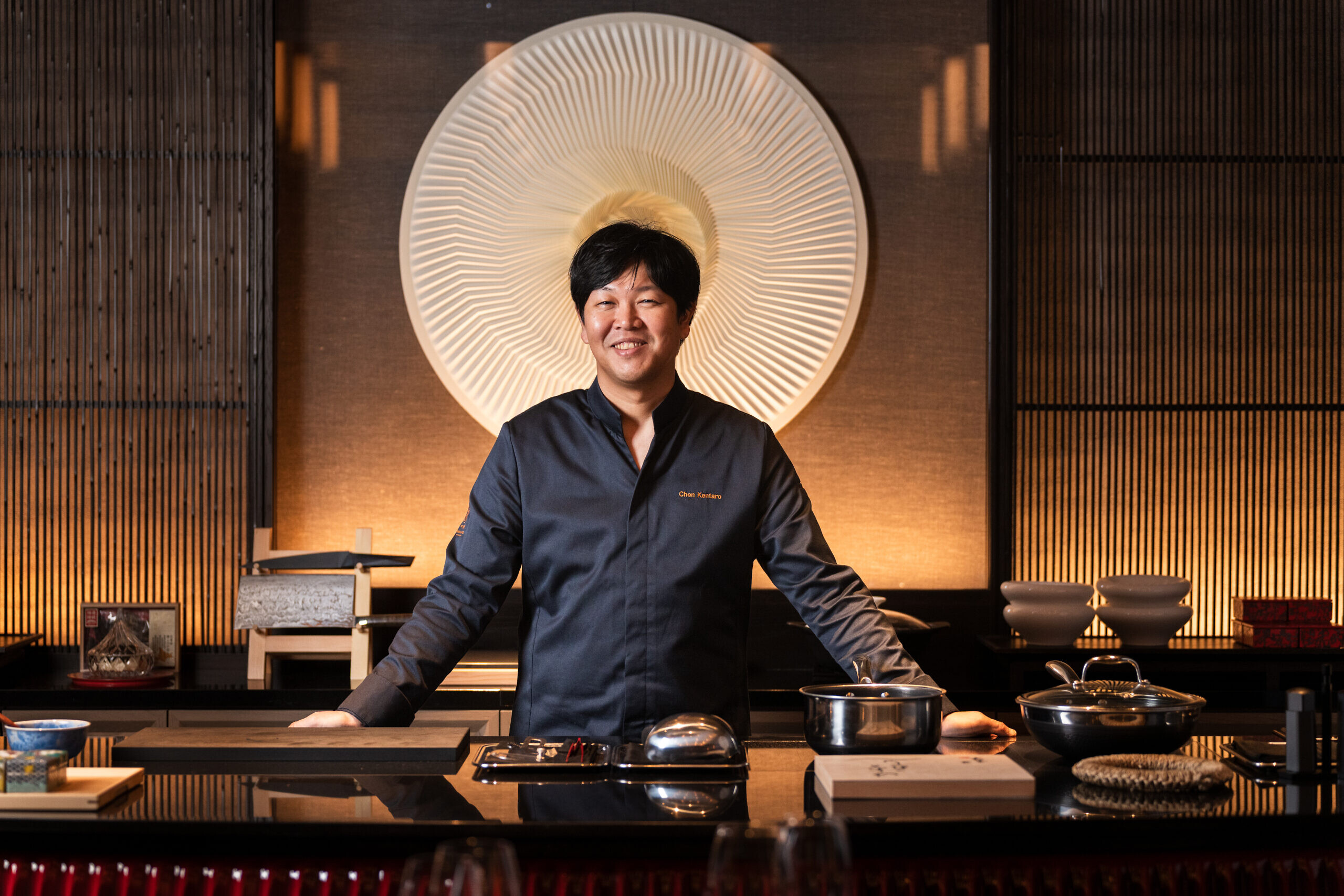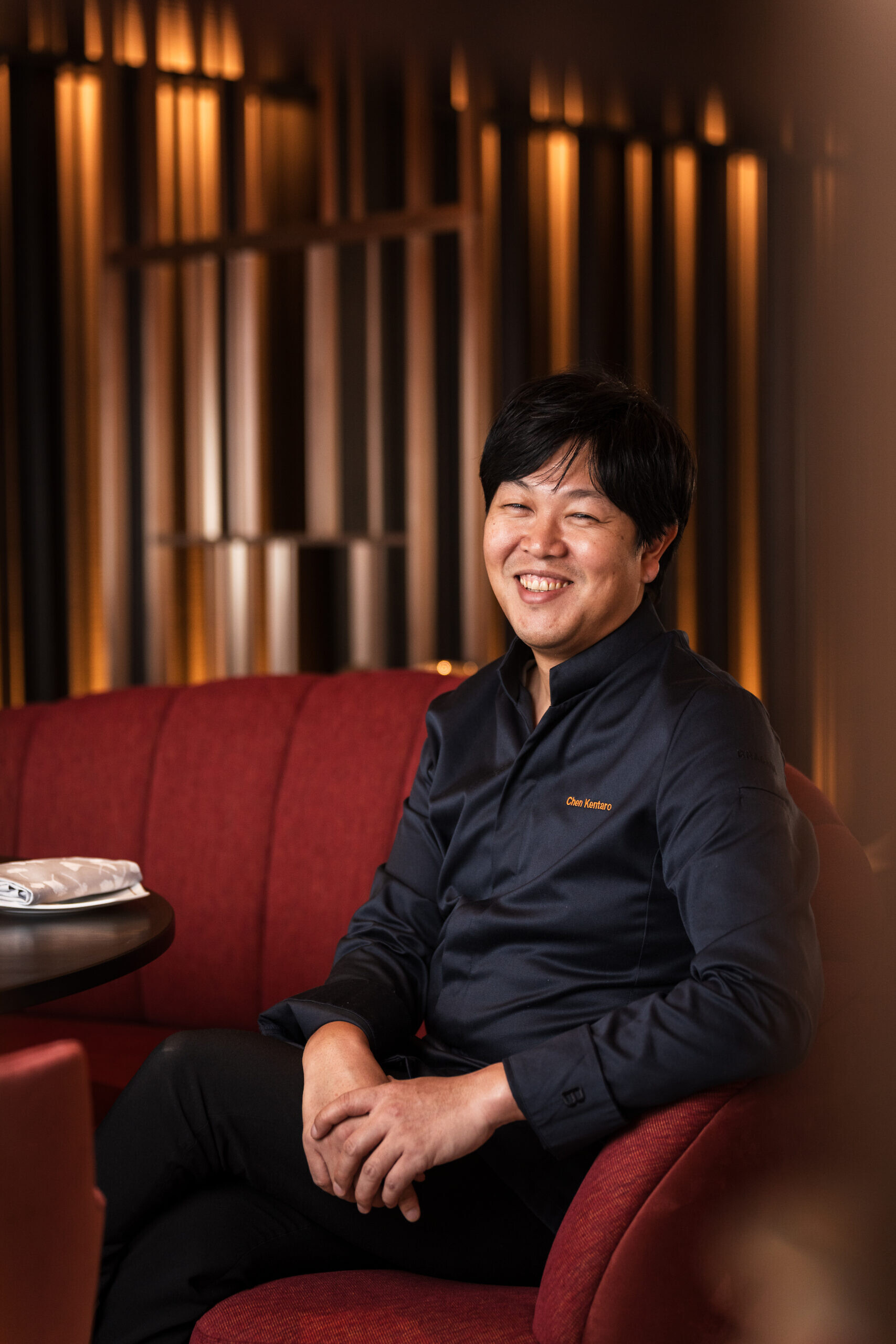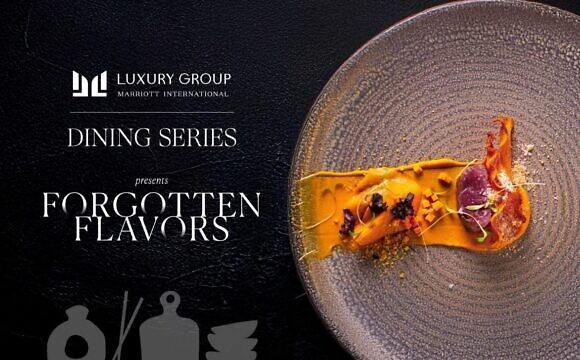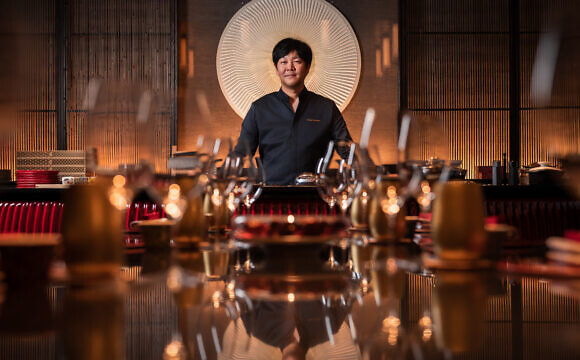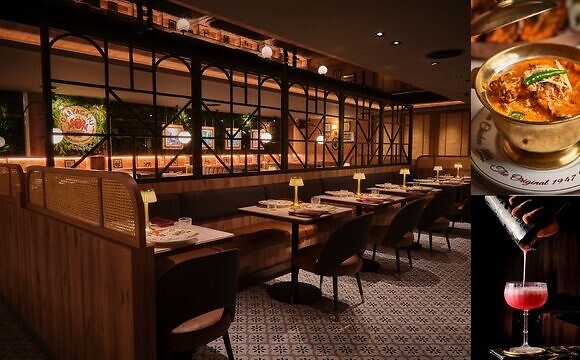Chen Kentaro grew up in a family where cooking was filled with passion and tradition. His grandfather introduced Szechwan cuisine to Japan, and his father became famous through Iron Chef. Inspired by their work, Kentaro trained in Chengdu, China, and now shares his own take on Chuka Ryori in Singapore. In this interview, he talks about his journey, how he balances old and new ideas, and what it means to carry on his family’s food legacy.
Q: Your family has a long and prestigious history in the culinary world. What was it like growing up surrounded by such a deep-rooted food culture?
A: Growing up in a family of legendary chefs, food meant something different – it was passion, tradition, and artistry. I watched my grandfather establish Shisen Hanten and introduce Szechwan cuisine to Japan, and my father showcase his culinary mastery on Iron Chef. Seeing them work with such dedication and skill was truly inspiring. From a young age, I knew that food would be my life’s work, not just to follow in their footsteps, but to take our family’s culinary legacy even further.
Q: How did your rigorous training in Szechwan, China, shape your understanding of authentic Szechwan cuisine?
A: Training in Chengdu was a transformative experience. I was immersed in the culture, learning Mandarin in the mornings and working in the kitchens at night. It was incredibly challenging because I had to learn everything from the fundamentals of the language and culture, to mastering the balance of spices that define Szechwan cuisine. Working with local ingredients and absorbing the philosophy behind each dish deepened my appreciation for its complexity. More than just technique, I learned the essence of Szechwan food, how to respect tradition while adapting it for different audiences.
Q: You’ve successfully brought Chuka Ryori to Singapore. What is it about this fusion of Chinese and Japanese flavors that excites you most?
A: Chuka Ryori (中華料理) is unique because it represents a fusion of two rich culinary traditions—Chinese and Japanese. My grandfather brought his knowledge of Szechwan cuisine to Japan when he moved there in 1952, and he adapted the flavours to suit Japanese tastes while preserving the heart of the dishes. What excites me most is how Chuka Ryori continues to evolve, blending bold Szechwan spices with the refinement and balance of Japanese cuisine. It is a cuisine deeply personal to me, as it tells the story of my family’s journey across generations and cultures.
Q: Your Red Mapo Tofu is a signature dish that has earned a Bib Gourmand distinction. What makes it so special, and what inspired you to perfect it?
A: Mapo Tofu is a dish that carries deep personal significance. It was one of the most memorable dishes I ate, made by my family members when I was growing up. Over the years, I grew to love its complex layers of flavour – the interplay of spice, umami, and the signature numbing sensation of Szechwan peppercorns.
What makes our Red Mapo Tofu special is the meticulous attention to ingredients. We use a house-made chilli oil and three-year-aged Pixian doubanjiang (fermented bean paste) from Chengdu, which gives it a deep, rich umami flavour. It is a dish that embodies both tradition and innovation, and I am honoured that it has been recognised with a Bib Gourmand distinction.
Most importantly, we focus on capturing the eight distinctive flavour profiles in the dish: tingly-numb (麻), spicy (辣), hot (燙), fragrant (捆), crispy (酥), tender (嫩), fresh (鮮), and aromatic (香) to create the signature flavours found only in our Red Mapo Tofu.
Q: You’ve expanded beyond fine dining with Chen’s Kitchen. What motivated you to make your dishes more accessible, and how does this new concept differ from Shisen Hanten?
A: Fine dining is an incredible experience, but I also wanted to create a space where people could enjoy high-quality Chuka Ryori dishes in a more relaxed setting. Chen’s Kitchen was born from this idea: a place where families and friends can gather, share a comforting meal, and experience our signature dishes without formality.
While Shisen Hanten is all about refined, elevated dining, Chen’s Kitchen offers an approachable menu that stays true to our culinary heritage. It allows me to reach more people and introduce them to the bold flavours of Chuka Ryori cuisine in a casual, welcoming environment.
Q: Balancing innovation with tradition can be challenging. How do you ensure that your dishes remain true to your roots while also appealing to modern palates?
A: For me, tradition is the foundation of any great dish. I always start with the authentic techniques and flavours I learned in Szechwan, and ensure that every dish respects its origins as well as my grandfather’s original recipes. However, I also believe that food should evolve. At my restaurants, we carefully balance authenticity with small adaptations – whether it is adjusting spice levels for different audiences or using modern techniques to enhance presentation. The key is to innovate without losing the soul of the dish.
Q: Szechwan cuisine is known for its bold flavors and heat. How do you balance spice levels while maintaining depth and complexity in your dishes?
A: Spice in Szechwan cuisine is not just about heat, it is about balance and depth. The essence of mala (麻辣) lies in the perfect harmony between numbing Szechwan peppercorns and fiery chillies, but true Szechwan cooking goes far beyond just spiciness. It is about layering flavours to create a rich, multi-dimensional experience that excites the palate without overwhelming it.
At my restaurants, we take great care in controlling spice levels by using the finest ingredients and precise cooking techniques. Some dishes are bold and fiery, while others are milder yet still packed with umami, ensuring there is something for every diner.
Q: The culinary world is constantly evolving. How do you stay inspired and continue pushing the boundaries of Szechwan cuisine?
A: I believe inspiration comes from curiosity. I am always learning, whether it is from my mentors, my travels, or simply through experimenting in the kitchen. Szechwan and Japanese cuisine both have such a rich history, but there is always room to explore new ideas.I love finding ways to introduce Szechwan flavours, Japanese techniques, and interesting ingredients, even from other global cuisines, to new audiences, whether through different cooking techniques or unexpected pairings. At the same time, I always stay grounded in the fundamentals, ensuring that the heart of the Chuka Ryori cuisine remains intact.
Q: With the growing interest in Asian cuisine globally, what do you think is the future of Szechwan cuisine, both in Singapore and internationally?
A: Asian cuisine involves engaging all five senses, helping the food create a stronger and more lasting impression. The flavour, aroma, and texture all play a crucial role in shaping the overall experience. Szechwan cuisine, in particular, has become extremely popular in recent times, and I believe its popularity will continue to grow. People are becoming more adventurous with flavours, and the bold, complex taste of Szechwan food appeals to many. In Singapore, we are already seeing a strong appreciation for it, and internationally, more chefs are incorporating distinct Szechwan elements into their dishes.
The key to its future success lies in education and quality. As long as chefs continue to respect its traditions while making thoughtful adaptations, Szechwan cuisine will thrive on the global stage.
Q: What advice would you give to aspiring chefs who want to follow in your footsteps and bring their cultural heritage into the modern dining scene?
A: My advice is to always stay true to your roots. Understanding the history and techniques behind your cuisine is essential before you can create something new. Do not rush the learning process, take the time to master the basics, respect the ingredients, and always cook with passion.
At the same time, be open to new ideas. The best chefs are the ones who honour tradition while embracing creativity. Most importantly, remember that food is about making people happy. If you cook from the heart, your passion will always shine through.
